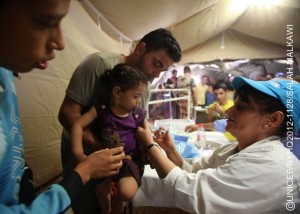救助敍利亞100萬名難民兒童
2013-08-23
 敍利亞內戰已踏入第3年,今天造成了第100萬名難民兒童,標誌着事件至今已導致逾百萬名敍利亞兒童被迫逃離家園。
敍利亞內戰已踏入第3年,今天造成了第100萬名難民兒童,標誌着事件至今已導致逾百萬名敍利亞兒童被迫逃離家園。迄今,敍利亞內戰已釀成國內外近500萬人受影響,當中188萬人淪為難民,逾半數為兒童。最新數字更顯示,其中740,000名難民兒童更只有11歲以下。
危機尚未結束
Aya——敍利亞難民兒童的真實故事:
8歲的Aya(左)是個甜美活潑的女孩,兩年前一家由敍利亞逃難到黎巴嫩。
來 到一個陌生的國度,他們一家9口住在狹窄的臨時帳篷。雖然他們每月均會獲發放食物券,但份量卻只夠維持大半個月的需求。當Aya的哥哥姊姊到菜田工作, 每日僅賺取相當於港幣31.2元(4美元)的酬勞幫補家計時,她就要留在家中照顧患有唐氏綜合症的11歲姊姊Libaba。Aya教曉姊姊如何洗澡、穿衣 及進食,對她呵護備至,兩人也成為彼此的最好朋友。 雖然Aya的哥哥姊姊仍然在學,但Aya卻因戰亂而失學,父母也再無法負擔Aya上學的交通費。所以每當姊姊們放學回家,充滿好奇心和求知欲的Aya就會問東問西。Aya希望將來成為一位兒科醫生,為家境貧困的孩子治病,不收分文。
UNICEF與當地民間伙伴合作,在兒童友好的中心環境內提供心理輔導、言語及物理治療,支援兒童及其家人。
Donate NOW to help the children of Syria












